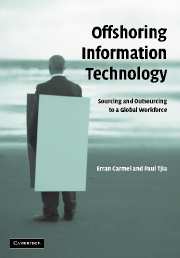Book contents
- Frontmatter
- Contents
- List of contributors
- Foreword
- Preface
- Acknowledgments
- Part I The fundamentals
- 1 The offshore landscape
- 2 Offshore economics and offshore risks
- 3 Beginning the offshore journey
- 4 The offshore country menu
- Part II Managerial competency
- Part III Other stakeholders
- References
- End notes
- Index
3 - Beginning the offshore journey
from Part I - The fundamentals
Published online by Cambridge University Press: 11 August 2009
- Frontmatter
- Contents
- List of contributors
- Foreword
- Preface
- Acknowledgments
- Part I The fundamentals
- 1 The offshore landscape
- 2 Offshore economics and offshore risks
- 3 Beginning the offshore journey
- 4 The offshore country menu
- Part II Managerial competency
- Part III Other stakeholders
- References
- End notes
- Index
Summary
Floral Systems (an alias) is a medium-sized Dutch software company. Driven by a need to reduce costs, it decided that the next release of its software product was to be built in India. The Dutch project manager had just met a representative of a large Indian provider at an American IT fair and decided to sign a contract with that firm. Problems started to occur almost as soon as the project got under way. Floral Systems used a development platform called Progress, which is not widely known in India. The Dutch firm had overlooked the fact that the Indian staff had no experience with the latest version of Progress, which was quite different from earlier versions. Knowledge transfer from Floral Systems to the provider also proved difficult. One year later, the offshore project was a failure and was abandoned. The company not only wasted a lot of money, but because its next product release could not be delivered on time, clients started to lose confidence. The project manager had already lost his job.
A more successful Dutch example is Metatude, which was founded in 2000. At that time, due to the IT labor shortage, this start-up could not recruit experienced software engineers. It had no choice but to go offshore. Initially Metatude investigated three countries: Bulgaria, India, and Bangladesh. Having prepared itself well, and weighing the trade-offs, it decided to focus on Bangladesh. Two managers visited this country for two weeks and had meetings with various service providers, foreign users, as well as the local Dutch embassy. […]
- Type
- Chapter
- Information
- Offshoring Information TechnologySourcing and Outsourcing to a Global Workforce, pp. 51 - 68Publisher: Cambridge University PressPrint publication year: 2005



